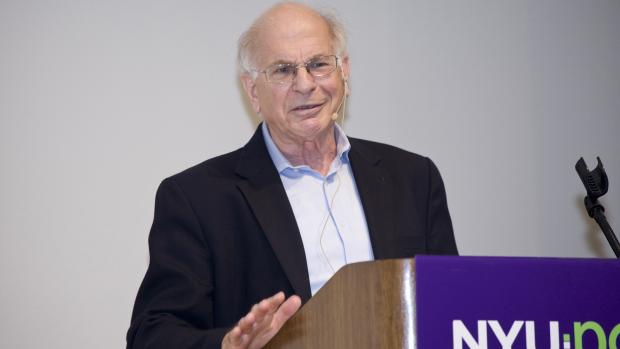Finding the Inventor Within
Forum Introduces Students to Leaders of Innovation and Their Mantras

In the third year of his Engineering and Technology Forum, Assistant Industry Professor David Lefer continues to encourage first-year students at NYU-Poly to embrace a culture of invention, innovation and entrepreneurship—what is referred to as i2e at NYU-Poly—both at the Institute and in the world at large.
Lefer addressed a group of approximately 300 students at the Pfizer Auditorium where they had gathered to hear the course’s first guest lecturer of the year, Dr. Daniel Kahneman, who received the 2002 Nobel Memorial Prize in Economics for his work on Prospect Theory and is a Senior Scholar at the Woodrow Wilson School of Public and International Affairs at Princeton University.
The Forum, sponsored in part by Verizon, invites leaders in both technical and non-technical disciplines to appear as guest lecturers each semester during one of the Forum’s regular meetings. This gives students insight into the strategies of successful inventors and entrepreneurs.
The class is divided into blogging teams in which students discuss the lectures and additional readings and post relevant articles and videos. The goal is to challenge students to think creatively in the fields of science, technology, engineering and math and inspire them to become the next generation of global innovators and inventors.
Students are required to work on a semester-long, technology-based project that they can enter in the Time Warner Cable Inno/Vention Competition at NYU-Poly, said Iraj Kalkhoran, Associate Provost of Undergraduate Academics. At the course’s end, each of the Forum’s participants pitches his or her idea to the entire class and a panel of judges made up of administrators, faculty and two winners from the previous year’s Inno/Vention contest.
Seeing is Believing
“People talk a lot about innovation, but in this course, students are immersed in innovation rather than just attending class,” said Kalkhoran, who attended the lecture. “We have speakers who say ‘Hey, I was in your seat 20 years ago.’ For students to see (extraordinarily successful people) in their fields is amazing and encouraging.”
The Forum’s first guest speaker of the year, Dr. Kahneman, discussed the concept of intuition, and why he has been a critic of trusting it. He explained that certain situations exist where intuition can be trusted. For example, in chess. We know the rules, and can study past behaviors in a structured environment, therefore it’s safer to predict a potential move.
People get into trouble, Kahneman said, when they make predictions based on intuition in a complex environment that is too irregular, such as on Wall Street.
He said the use of the word “know” promotes an illusion that we understand the world we live in. “I don’t think anyone can know what will happen in an economic system.”
Kahneman shared several stories from his past that have shaped his intellectual life. As a young man serving as a psychologist in the Israeli army, Kahneman observed an activity in which a group of soldiers were asked to participate in an obstacle course to see how each operated as part of a group setting to evaluate them as candidates for officer training school. As he watched the soldiers complete the course, he thought he could predict their capabilities and their weaknesses.
"You're convinced you see leadership. You think you know their nature," he said. "We found out that what we saw was worthless. Our predictions were all off."
People like to trust their gut feelings, but they often only admit they had such a feeling if the prediction turns out to be true, therefore, intuition gets a much better reputation than it deserves, he said.
We often have confidence in our predictions, which is also misplaced. "Confidence comes from the quality of the story you tell yourself," he said. "But you can make coherent stories that shouldn't be believed."
An Inspired Foundation
Following the lecture, several students were invited to join Lefer and Kahneman for a special lunch in the library. The lunch was an opportunity for students to extend their conversation with Kahneman, engage with their classmates and build relationships with people they’ll be working with for the next several years. The students were chosen based on the quality of the blogs they had previously submitted for class.
Student Sue Nopachinda, a freshman interested in civil engineering, said she believes the class will help her become a better communicator and is introducing her to technology of which she was previously unaware. She is studying handrails that could collect rainwater for her invention project. She’s interested in this topic because practicality often fuels innovation. “What can we use everyday that would make our lives better?” she asked.
Upcoming guest lecturers include: Dr. Uday Kumar, the founder and chief medical officer of iRhythm Technologies, Inc., Marissa Mayer, vice president of Location and Local Services at Google and John Trani, who has had a distinguished career as an executive at several innovative companies and is a graduate of Brooklyn Polytechnic (NYU-Poly) Institute.




